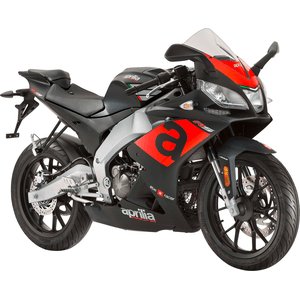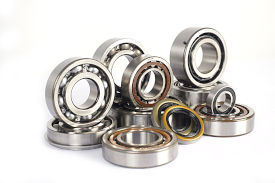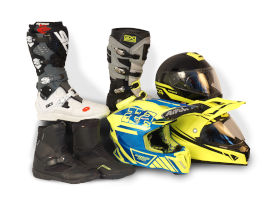Aprilia RS 125 (2017–2022) Review: A Sportbike Masterclass for Aspiring Racers

When Aprilia introduced the RS 125 in 1992, it wasn’t just building a motorcycle—it was creating a legend. The 2017–2022 iteration of the RS 125 carries that legacy forward, blending track-bred DNA with road-friendly practicality. Designed for riders stepping into the sportbike world, this machine doesn’t just mimic its larger RSV4 sibling—it embodies the same racing spirit in a compact, accessible package. Let’s dissect what makes this 125cc screamer a standout in its class.
Design & Ergonomics: Born on the Racetrack

Aggressive Aesthetics
The RS 125’s design is a love letter to Aprilia’s MotoGP heritage. The triple LED headlight cluster, borrowed directly from the RSV4, screams aggression, while the sharp fairing lines and underbelly exhaust create a silhouette that looks faster standing still than some bikes do at full tilt. Color schemes like Sintesi Blue and Aprilia Black accentuate its predatory stance, with the iconic “a” logo plastered proudly on the fuel tank—a nod to 20 world titles earned on circuits worldwide.
Rider-Focused Ergonomics
At first glance, the RS 125’s riding position seems uncompromising: clip-on handlebars set low, rearset footpegs, and a narrow seat that locks you into place. Yet, the 820 mm (32.3-inch) seat height remains accessible for shorter riders, and the contoured tank provides just enough knee grip without feeling cramped. This isn’t a commuter bike pretending to be sporty—it’s a genuine race replica that forces you to ride like a racer.
Practical Touches
Aprilia surprises with thoughtful details:
- Storage: A 6-inch tablet-friendly compartment under the seat (a rarity in this segment).
- USB Port: For charging devices mid-ride.
- Quick-Release License Plate Mount: Swap to a track tail in minutes.
Engine Performance: Small Displacement, Big Personality

The Heart of the Matter
The 124.2cc liquid-cooled DOHC 4-valve single-cylinder engine is a masterpiece of efficiency. While peak figures of 14.8 HP @ 10,000 RPM and 11.2 Nm (8.3 ft-lbs) @ 8,000 RPM won’t threaten superbikes, the real story is in the delivery. The revised Euro 5-compliant engine (2021 onward) smoothens low-end torque, pulling cleanly from 6,000 RPM before howling to its 11,500 RPM redline.
Fuel Efficiency & Range
With a claimed 2.6 L/100 km (90.47 MPG), the 14.5L (3.83-gallon) tank delivers a 550 km (342-mile) range—enough for weekend canyon blasts or daily commutes. The catch? You’ll need premium fuel to keep this high-strung single happy.
Quick-Shifter Compatibility
Though not standard, the RS 125 is pre-wired for an optional quick-shifter. Clutchless upshifts add a layer of track-day authenticity, letting you keep the throttle pinned while chasing apexes.
Chassis & Handling: Where Aprilia Reigns Supreme
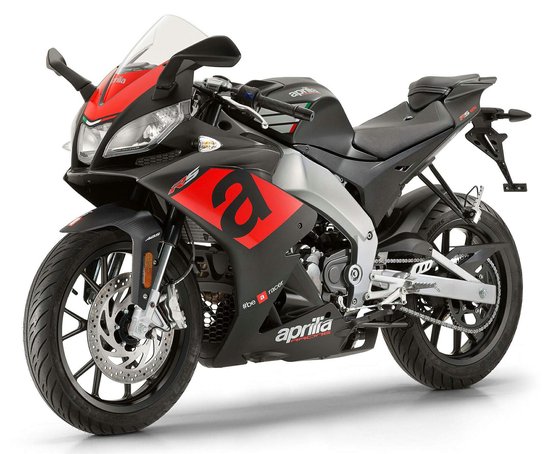
Frame & Suspension
The aluminum perimeter frame is the RS 125’s secret weapon. Weighing just 144 kg (317.5 lbs) wet, it’s stiffer than rivals’ steel frames, translating to razor-sharp turn-in. Paired with a 41 mm upside-down fork (110 mm travel) and asymmetric swingarm-mounted monoshock (120 mm travel), the setup balances aggressive damping for track use with enough compliance for pockmarked roads.
Brakes & ABS
A 300 mm front disc bitten by a radial 4-piston caliper (with Bosch ABS) provides stoppage power that borders on overkill for a 125cc bike. The rear 218 mm disc is more than adequate, though most riders will rely on the front. ABS is single-channel (front wheel only) but can be disabled for track purists.
Wheels & Tires
The 17-inch alloy wheels shod in 100/80-ZR17 (front) and 140/70-ZR17 (rear) rubber offer sublime feedback. Later models (2021+) upgraded to a stickier 140-section rear tire, improving corner exit grip.
Instrumentation & Tech: Racing DNA, Modern Flair
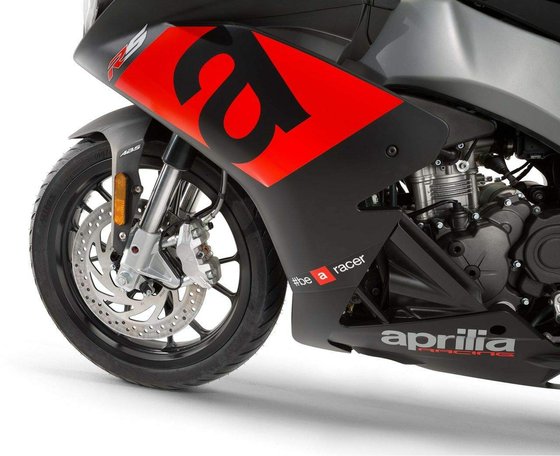
The digital dash is a miniaturized race suite:
- Analog Tachometer: Dominates the display, because race bike.
- Gear Position Indicator: Essential for keeping the engine on boil.
- Lap Timer & Fuel Economy Readouts: For data-hungry riders.
- Smartphone Connectivity: Via optional AMP ECU module.
It’s not TFT flashy, but it’s purposeful—like the rest of the bike.
Competition: How the RS 125 Stacks Up
1. Yamaha YZF-R125
- Pros: Smooth 15 HP liquid-cooled engine, comfier seat.
- Cons: Steel frame feels less agile, dated design.
- Verdict: Better for daily use, less thrilling on track.
2. KTM RC 125
- Pros: Punchy 15 HP motor, WP suspension.
- Cons: Polarizing looks, harsh ride quality.
- Verdict: A hooligan alternative but less refined.
3. Honda CBR125R
- Pros: Bulletproof reliability, lower price.
- Cons: Air-cooled engine lacks zest, basic components.
- Verdict: Commuter first, sportbike second.
Aprilia’s Edge: The RS 125’s aluminum frame and race-derived geometry make it the only 125cc bike that truly feels like a scaled-down superbike. It’s the choice for riders prioritizing handling over outright power.
Maintenance: Keeping Your RS 125 Razor-Sharp

Key Service Intervals
- Oil Changes: Every 6,000 km (3,728 miles) with 10W-50 synthetic.
- Chain Adjustment: Every 1,000 km (621 miles)—this is a high-strung engine with vibes.
- Valve Checks: Every 12,000 km (7,456 miles). The DOHC head demands precision.
- Coolant Flush: Every 2 years or 24,000 km (14,912 miles).
Common Upgrades
- Exhaust Systems: Swap the stock can for an SC Project or Arrow slip-on (gains ~1 HP and saves weight).
- Adjustable Levers: Improve feel during aggressive braking.
- Rearset Adjusters: Fine-tuning footpeg position for track days.
- High-Performance Tires: Bridgestone Battlax or Pirelli Diablo Rosso III.
MOTOPARTS.store Recommendations
- DNA Air Filters: Unlock smoother throttle response.
- EBC HH Sintered Brake Pads: For bite that matches the radial calipers.
- Ergonomic Seat Covers: Add comfort during long rides without ruining the bike’s lines.
Conclusion: The Ultimate Entry-Level Sportbike?

The Aprilia RS 125 isn’t just a motorcycle—it’s a mentorship on two wheels. It teaches you to carry corner speed, to brake late but precisely, and to respect momentum. While rivals prioritize comfort or cost-cutting, the RS 125 remains unapologetically focused on delivering a pure sport riding experience.
Is it perfect? The seat could be softer, and the lack of a standard quick-shifter stings. But for riders dreaming of knee-down heroics or eventual leaps to larger Aprilias, this 125cc champion is the ultimate starting grid.


Specifications sheet
| Engine | |
|---|---|
| Stroke: | Four-stroke |
| Max power: | 11 kW | 15.0 hp |
| Max torque: | 11 Nm |
| Fuel system: | Fuel Injection (Magneti Marelli MIUG4 32 mm ECU) |
| Max power @: | 10000 rpm |
| Displacement: | 124 ccm |
| Fuel control: | Double Overhead Cams/Twin Cam (DOHC) |
| Max torque @: | 8000 rpm |
| Bore x stroke: | 58.0 x 47.0 mm (2.3 x 1.9 in) |
| Configuration: | Single |
| Cooling system: | Liquid |
| Emission details: | Euro 5 |
| Compression ratio: | 12.5:1 |
| Lubrication system: | Wet sump |
| Number of cylinders: | 1 |
| Valves per cylinder: | 4 |
| Dimensions | |
|---|---|
| Wheelbase: | 1350 mm (53.1 in) |
| Dry weight: | 122 |
| Wet weight: | 144 |
| Seat height: | 820 mm (32.3 in) |
| Overall width: | 760 mm (29.9 in) |
| Overall height: | 1135 mm (44.6 in) |
| Overall length: | 1968 mm (77.4 in) |
| Fuel tank capacity: | 14.5 L (3.8 US gal) |
| Reserve fuel capacity: | 3.5 L (0.92 US gal) |
| Drivetrain | |
|---|---|
| Final drive: | chain |
| Gear ratios: | 1st 11/33, 2nd 15/30, 3rd 18/27, 4th 20/24, 5th 25/27, 6th 23/22 |
| Transmission: | 6-speed |
| Rear sprocket: | 58 |
| Front sprocket: | 13 |
| Primary drive ratio: | 29/69 (2.38) |
| Maintenance | |
|---|---|
| Rear tire: | 140/70-z-17 |
| Engine oil: | 10W40 |
| Front tire: | 100/80-17 |
| Brake fluid: | DOT 4 |
| Spark plugs: | NGK CR8E or NGK CR8EIX |
| Spark plug gap: | 0.8 |
| Coolant capacity: | 1.5 |
| Engine oil capacity: | 1.2 |
| Valve clearance (intake, cold): | 0.10–0.20 mm |
| Valve clearance check interval: | 24,000 km (15,000 mi) |
| Valve clearance (exhaust, cold): | 0.20–0.30 mm |
| Recommended tire pressure (rear): | 2.5 bar (36 psi) |
| Recommended tire pressure (front): | 2.25 bar (33 psi) |
| Chassis and Suspension | |
|---|---|
| ABS: | Bosch dual-channel with anti-roll-over system |
| Frame: | Aluminum perimeter frame |
| Wheels: | 6-split-spoke lightweight alloy (tubeless) |
| Rear brakes: | Single 220 mm disc, 1-piston caliper (Bosch dual-channel ABS) |
| Front brakes: | Single 300 mm disc, 4-piston radial caliper (Bosch dual-channel ABS) |
| Rear suspension: | Asymmetrical swingarm with monoshock absorber, adjustable spring preload |
| Front suspension: | 41 mm upside-down hydraulic fork |
| Rear wheel travel: | 120 mm (4.7 in) |
| Front wheel travel: | 110 mm (4.3 in) |



